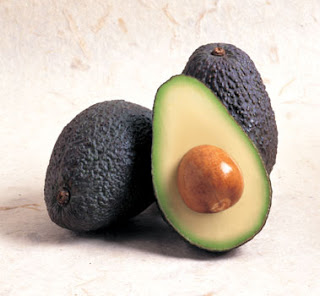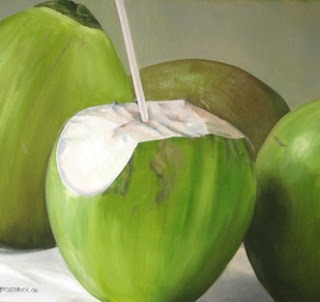We need different kinds of fruits and veggies so that we can get all necessary vitamins and minerals needed in our bodies to live sane lives.
Apple
Apple is a highly nutritive food. It contains minerals and vitamins in a good quantity. On an average, 100 grams of apple contains: 84.6% moisture, 0.2% protein, 0.5% fat, 0.3% minerals, 1.0% fiber, 13.4% carbohydrates.
Apple is a highly nutritive food. It contains minerals and vitamins in a good quantity. On an average, 100 grams of apple contains: 84.6% moisture, 0.2% protein, 0.5% fat, 0.3% minerals, 1.0% fiber, 13.4% carbohydrates.
It provides 10 mg. calcium, 14 mg. phosphorus, 1 mg. iron, 40 IU of vitamin A and around 59 calories. There are small amounts of vitamin E, H and B-Complex too.
The skin of the apple and flesh contain more vitamin C and A than the inner flesh. The apple has malic acid, which is completely utilized by the body. This malic acid is beneficial to the bowels, liver and brain.
The active medicinal ingredient of apple is pectin, found in the inner portion of the rind and pulp that aids in detoxification by supplying of glacturonic acid, necessary for the elimination of certain harmful substances.
Mango
Mango
Raw mango is rich source of pectin, oxalic, citric, malic, and succinic acids. It is a good source of vitamin C, B1, and B2 too.The ripe fruit is very wholesome and nourishing. The principal ingredient of mango is sugar. There are citric, malic and tartaric acids in a ripe mango that are beneficial to the body and help maintain the alkali reserved of the body. On an average, 100 grams of mango contains 81.0% moisture, 0.6% protein, 0.4% fat, 0.4% minerals, 0.7% fiber and 16.9% carbohydrates.
It provides 14 mg. calcium, 16 mg. phosphorus, 1.3 mg. iron, 16.0 mg. vitamin C and a small amount of vitamin B complex.
It provides 14 mg. calcium, 16 mg. phosphorus, 1.3 mg. iron, 16.0 mg. vitamin C and a small amount of vitamin B complex.
Its calorie value is 74.
The ripe mango nourishes the body by increasing gastric juice, blood, flesh, fat, bone marrow and semen. This fruit is also beneficial in liver disorders, loss of weight and other physical disturbances.
Avocado
Avocado
Avocado contains fat, which is wholly free from the unpleasant butyric acid. It is a rich source of vitamin A and maintains high resistance against bacterial infection. The protein of avocado is of finest quality. The pulp of the fruit is so free from fiber that it forms with water a fine emulsion, which closely resembles milk in consistency and appearance.
Per 100 grams of edible portion, it contains 73.6% moisture, 1.7% protein, 22.8% fat, 1.1% minerals and 0.8% carbohydrates.
It provides 10 mg. calcium, 80 mg. phosphorus, 0.7 mg. iron and 290 international units of vitamin A. There is sufficient of vitamin E and a small amount of vitamin C and B-Complex. Its calorie value is 215.
Banana
This fruit is a constitution of tissue building elements, protein, vitamins, minerals, and calories, along with sugar and high grade protein, which include three essential amino acids.
Per 100 grams of edible portion, it contains 73.6% moisture, 1.7% protein, 22.8% fat, 1.1% minerals and 0.8% carbohydrates.
It provides 10 mg. calcium, 80 mg. phosphorus, 0.7 mg. iron and 290 international units of vitamin A. There is sufficient of vitamin E and a small amount of vitamin C and B-Complex. Its calorie value is 215.
Banana
This fruit is a constitution of tissue building elements, protein, vitamins, minerals, and calories, along with sugar and high grade protein, which include three essential amino acids.
Per 100 grams, it contains 70.1% moisture, 1.2% protein, 0.3% fat, 0.8% minerals, 0.4% fiber and 27.2% carbohydrates. It provides 17 mg. calcium, 36 mg. phosphorus, 0.9 mg. iron, 7 mg. vitamin C and small amount of vitamin B Complex.
Its calorie value is 116.
This is supposed to be a complete balanced diet if combined with milk.
Grapes
Its calorie value is 116.
This is supposed to be a complete balanced diet if combined with milk.
Grapes
Grape is a highly valued food due to its rich content of sugar, which is formed almost entirely by glucose. Grapes glucose is easily assimilated and helps in the metabolism of glucose which is helpful for proper functioning of heart and other physiologically important organs.
Per 100 grams, grapes contain 92.0% moisture, 0.7% protein, 0.1% fat, 0.2% minerals and 7.0% carbohydrates.
It has 20 mg. calcium, 20 mg. phosphorus, 0.2 mg. iron, 31 mg. vitamin C and small amount of vitamin B Complex, vitamin A and P.
Its calorie value is 32.
Papaya
Ripe papaya is an excellent tonic for growing children, for pregnant women and nourishing mothers. It is a boon for the stomach.
Per 100 grams of edible portion, it contains 90.8% moisture, 0.6% protein, 0.1% fat, 0.5% minerals, 0.8% fiber and 7.2% carbohydrates.
This provides 17 mg. calcium, 13 mg. phosphorus, 0.5 mg. iron, 57 mg. vitamin C and a small amount of vitamin B Complex.
Its calorie value is 32.
The most important content of papaya is the protein digesting enzyme in the milky juice or lather which is carried in a network of vessels. This enzyme is similar to pepsin in its digestive action. This enzyme can digest protein – 20 times than its own weight.
Coconut
Coconut is highly nourishing food. It has a high oil content that is easily digestible. Its oil resembles butter in physical and chemical properties. The protein content of coconut is of high quality, containing all the amino acids.
Per 100 grams of edible portion, it contains 36.3% moisture, 4.5% protein, 41.6% fat, 1.0% minerals, 3.6% fiber, and 13.0% carbohydrates.
It provides 10 mg. calcium, 240 mg. phosphorus, 1.7 mg. iron, 1 mg. vitamin C and a small amount of vitamin B Complex. Fresh coconut’s calorie value is 444 and dried coconut’s calorie value is 662 (per 100 gm.).
Its tender kernel contains various enzymes and is easily digestible. The water of a single coconut contains sufficient vitamin C to meet the daily requirements of the body. It also contains several vitamins of B-Complex group. Its water is a good source of several minerals too.








Eat these fruits to have the nutrients you need. Take supplements if you think you lack nutrients in your body; check out Vitamins Canada now.
ReplyDeleteThanks for offering us such a useful details. Keep up the great work. You can also check out this awarded Vitamin supplement store for nutritional supplements from leading brands.
ReplyDeleteNutritional Supplement Store